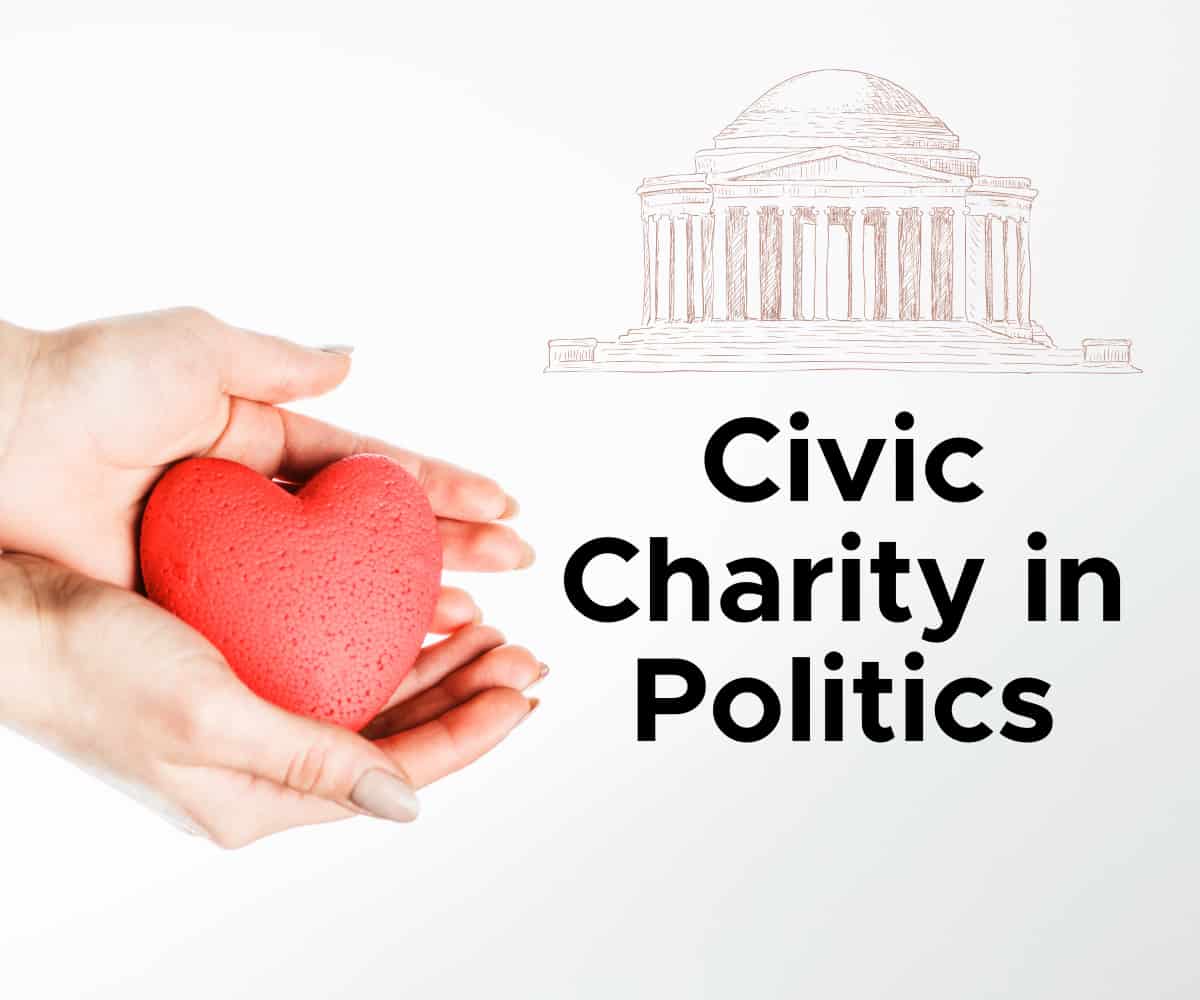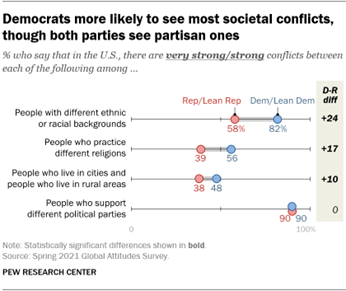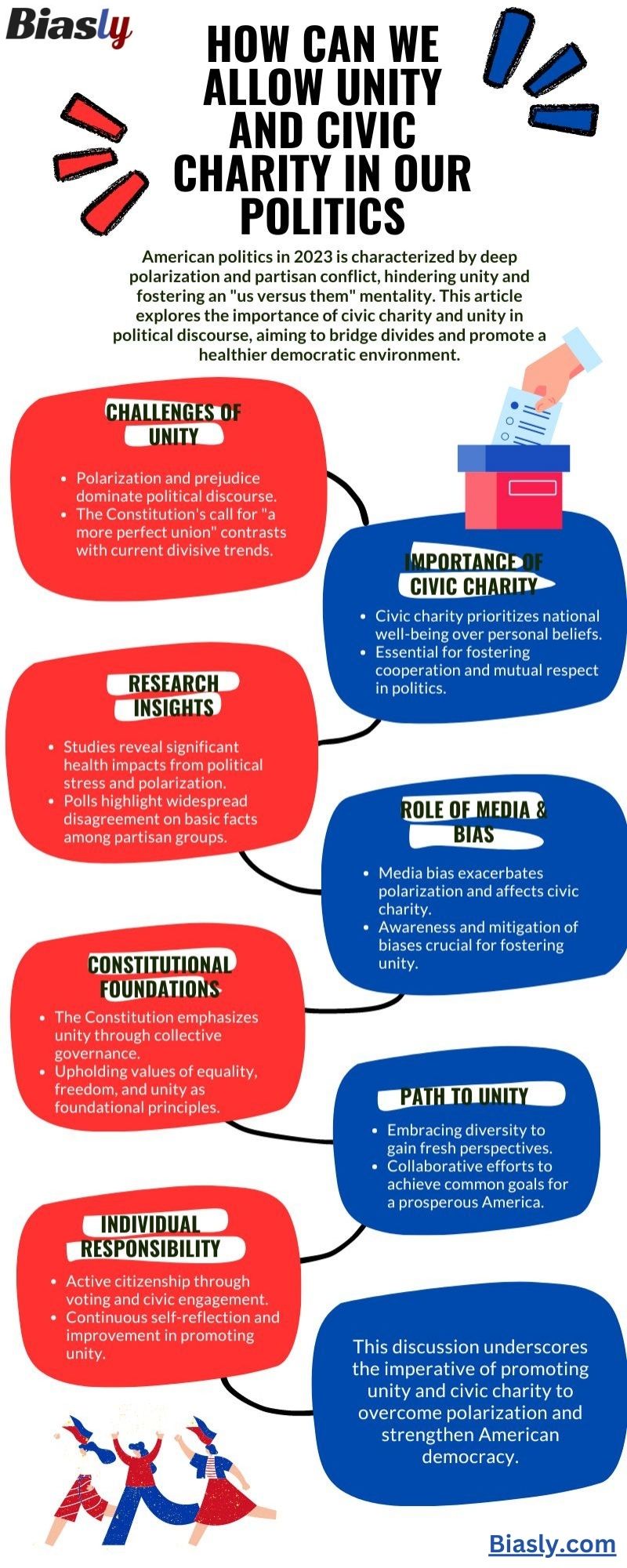
2023 finds American politics suffering from polarization, prejudice, fault finding, and condemnation. Liberal Democrats vs Conservative Republicans struggle to work together in political life, forming an “us versus them” political culture. Yet, while the Constitution’s Preamble “A more perfect union” indicates that states must stay together so that they can operate as a unified nation, this is not the case in modern life.
We as citizens must alter our social and political mindsets to allow for unity and civic charity to take place in our politics. As a simple definition, civic charity sets aside personal beliefs and focuses instead on the bigger picture and well-being of the country.
So, by looking at the effects of discord in the media of American politics and studies regarding Civic dialogue, there is a prolonged need for unity and civic charity in our political life… but how will this be achieved?
Unity is like exercise: a great idea with a monumental challenge
The Vanderbilt Project on Unity & American Democracy provides an analogy of union in American politics: “Embracing unity is like exercise: a great and noble idea, but difficult and all too easy to forego.” The history of American democracy proves that when Americans unite, extraordinary things happen. Yet, amidst a global pandemic that brought social and economic issues to the surface, there is urgent importance for Americans to have faith in democracy, in government, and in each other.
Through research and evidence, Vanderbilt’s goal is to bridge the gap that divides democracy and use evidence-based research to create a path to unity. Projects and platforms such as these are key to learning how we can allow unity and civic charity back into our political life. Additionally, by looking at fact-based data and the detrimental effects of polarization in politics and media bias and its effects on civic charity, critical steps are taken in the investigation of how we can return civic charity and unity into American politics.
So just how much civic charity is present in our politics today? The National Library of Medicine looked to quantify physical, psychological, and social health effects on American adults concerning politics. The shocking results stated that large numbers of Americans reported:
“Politics takes a significant toll on a range of health markers– everything from stress, loss of sleep, or suicidal thoughts to an inability to stop thinking about politics and making intemperate social media posts.”
The research further states that polls suggested that partisan discord escalated to a point where opposing sides disagreed on basic facts.
Polarization, which is the stark division of contrasting groups or sets of opinions or beliefs, is at an influx in our political system today. Mentally, physically and psychologically, scientific research emphasizes the negative effects of discord on the American political system. For example, consider this table from Pew Research Center which highlights the strong conflicts that exist ranging from ethnic, racial, and political conflicts.

Source:
Pew Research
These large political divisions highlight the ongoing social conflicts and prove the lack of unity that can be found in modern-day politics. As wide-ranging issues amongst race, gender, and endless issues continue to come to light, it is more important now than ever to allow for unity and civic charity in politics.
Perhaps the clearest solution would be for the government and its citizens to prioritize collaboration and unity– to promote the well-being of a nation over one’s self-interests that negatively affect their health.
Unity and civic charity will be possible only when we can increase our open-mindedness and collaboration to decrease polarization in our political system. Additionally, polarization can be overcome through awareness of our political and media bias and Biasly’s bias meter. Political bias is inevitable and is a deprecatory feature of the media today. Consider just a few examples from the World Economic Forum of cognitive political biases and how they may affect you:
- Confirmation bias- favoring or seeking information that affirms your pre-existing beliefs
- Coverage bias- the extent to which different issues are discussed
- Concision bias- focusing selectively on information (talking points versus sound bites)
Even if our bias is limited, it still impacts our personal interests and beliefs, thus altering and negatively impacting unity and civic charity. If we are unaware or do not take action to limit our bias, our country will continue to lack the critical and much-needed unity and civic charity that draws Americans together.
Unity in the Constitution: “We the people”
When we look towards the future to address civic charity in politics, it is imperative to consider that unity and the concept of working together to build a better America came from the Constitution. In 1787, when the framers came together to create the Founding documents, they wanted a community of people and structured governance to provide and protect our unalienable rights of life, liberty, and property.
While times have evolved, the Constitution still serves as the law of the land, meaning that its message and values should be preserved. Benjamin Franklin cautioned at the Philadelphia Convention that it would take hard work to “keep” the Republic that they had just created– that hard work requires civic charity and a united front.
As “We the people” is written in the Preamble of the Constitution that defines the country as a unified front, this reflects that unity is a core principle of American society. The United States is a diverse country, and there is no doubt that it is difficult to create commonalities with such diversity.
What can we as a nation do to add more civic charity and unity?
- Hold ourselves to the highest standard where values of equality and freedom are at the forefront
- Take advantage of our diversity and differences by using them as a new and fresh perspectives
- Embrace our commonalities by positively supporting and interacting with one another
- Join forces to achieve results instead of struggling individually
- Have a like-minded goal for a thriving and prosperous America
- Actively participate as citizens of society through voting and activism
- Continue to reflect on individual behaviors– remembering that there’s always room to improve
Although this idea of civic charity and unity seems daunting, there is no question that it is possible. It begins with replacing prejudice and fault-finding with openness and collaboration; with encouraged unity rather than prejudice. The distressing effects suggesting that politics negatively affect mental, physical, and emotional health as a result of the stress of polarizing conflicts are a clear indicator that there needs to be change in American political culture. It is the call of this generation to assure these changes, just as the Constitution reminds us.
As the Federal Bar Association suggests, “Unity does not mean uniformity.” Instead, each of our unique talents and interests contributes to the country as a whole. Putting aside our self-interests and appreciating the bigger picture and well-being of the country will show the power of unity and civic charity.























